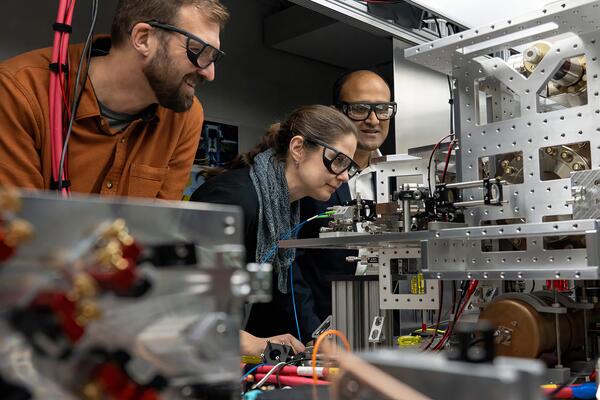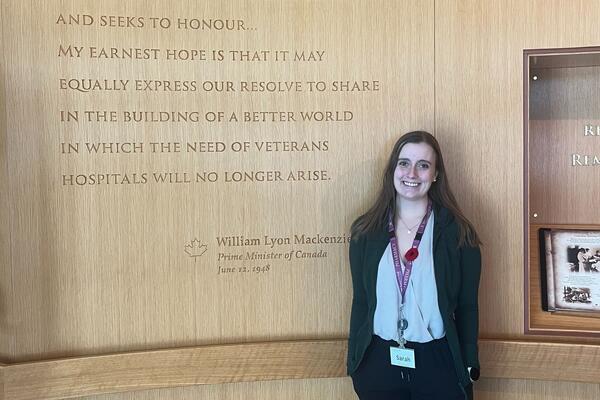
Advancing physics and reclaiming Indigenous roots
Kaylee Biggart is reclaiming pieces of culture that have been lost within her family while completing her PhD in physics

Kaylee Biggart is reclaiming pieces of culture that have been lost within her family while completing her PhD in physics
By Sarah Fullerton Faculty of ScienceOn June 21, we pay special attention to National Indigenous People’s Day, a day for all Canadians to honour and celebrate the legacy, diverse cultures and exceptional contributions of First Nations, Inuit and Métis Peoples.
Kaylee Biggart, a PhD student in the Department of Physics and Astronomy, is making significant strides in experimental condensed matter physics while reclaiming her cultural heritage.
 Biggart is of mixed-race Cree heritage, tracing her Indigenous roots to her kôhkom (grandmother), who survived a period of time when a series of policies in Canada led to the large-scale removal of Indigenous children from their families and placement in predominantly white foster homes, resulting in a profound loss of cultural heritage in the 1960s. This period is now referred to as the Sixties Scoop.
Biggart is of mixed-race Cree heritage, tracing her Indigenous roots to her kôhkom (grandmother), who survived a period of time when a series of policies in Canada led to the large-scale removal of Indigenous children from their families and placement in predominantly white foster homes, resulting in a profound loss of cultural heritage in the 1960s. This period is now referred to as the Sixties Scoop.
Originally from Caroline, a small town in Alberta with a population of 500, Biggart developed a passion for physics in high school and participated in the Women in Scholarship, Engineering, Science, and Technology (WISEST) program. This initiative places underrepresented groups of high school students in research labs at the University of Alberta to promote diversity in STEM. After completing a six-week placement in a physics lab at the university, Biggart solidified her decision to pursue the subject further and completed her undergraduate studies at the University of Alberta.
After completing her Bachelor of Science degree, Biggart took a four-year break to rediscover herself beyond academics before moving across the country to the University of Waterloo for her master’s and now PhD. Her decision to study physics at Waterloo was influenced by Nobel Laureate Dr. Donna Strickland's association with the University. She was also impressed by a research paper Dr. Rob Hill authored, detailing an experimental design that used dental floss to secure components with exceptional precision. Hill is now her supervisor.
Under the supervision of Dr. Hill, Biggart’s PhD research focuses on experimental condensed matter physics, specifically studying the transport properties of materials. There are two mechanisms she studies: thermal conductivity (measuring how readily heat moves through material) and using magnetic fields to understand the magnetic properties of a material. Biggart explains that this work is crucial as it provides essential knowledge that research groups can use to advance material science and technology.
Waterloo researchers take a unique approach to developing future-focused solutions by unlocking barriers to for their innovations and research to have real-world impact. While making waves in her field, her time as a PhD student has not been without challenges. In the summer of 2021, Biggart was deeply affected learning more of the tragic history of residential schools in Canada and the number of Indigenous children and families who have been affected. Recognizing the need to be fully present during lab work, she took several weeks off for emotional and safety reasons. Despite the incredible support of her supervisor during that time, Biggart struggled to find peers who could fully understand her perspective as the only Indigenous person in the department.
Biggart acknowledges that her experience as an Indigenous person is different from one who grew up on a reserve. “One of the biggest struggles I have with my identity is not feeling Indigenous enough,” she says. “Because I am white-passing and because my kôhkom didn’t know our culture, I must rediscover my heritage on my own. However, I have realized if I don’t call myself Indigenous and if I don’t make the effort to embrace and uplift my culture, then the Sixties Scoop and residential schools have won.”
That’s why in addition to conducting her PhD research, Biggart is also making a purposeful effort to relearn and reclaim pieces of culture that have been lost within her family so that she can hopefully pass them on to her children one day. She started by learning the Cree language through a book called "100 Days of Cree" by James McLeod.
Inspired by the WISEST program that ignited her academic career in physics, Biggart is passionate about diversifying the STEM field and giving back to the community. You can find her connecting with early-career physicists and undergraduate students at events like the Canadian Undergraduate Physics Conference, and offering support, advice, and resources to undergraduates during her time at Waterloo.

Read more
And a new model for how quantum research is shared — opening doors for the next generation of scientists and entrepreneurs

Read more
Here are the people and events behind some of this year’s most compelling Waterloo stories

Read more
Waterloo pharmacy alum and Sunnybrook Health Science Centre team deliver compassionate care to those who have served in the Canadian military
The University of Waterloo acknowledges that much of our work takes place on the traditional territory of the Neutral, Anishinaabeg, and Haudenosaunee peoples. Our main campus is situated on the Haldimand Tract, the land granted to the Six Nations that includes six miles on each side of the Grand River. Our active work toward reconciliation takes place across our campuses through research, learning, teaching, and community building, and is co-ordinated within the Office of Indigenous Relations.